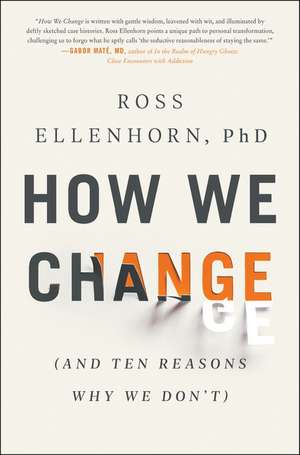How We Change: (And Ten Reasons Why We Don't)
Autor Ross Ellenhornen Limba Engleză Paperback – 20 feb 2023
How is it that we are able to so radically and rapidly change our daily behavior in order to follow the social distancing and stay-at-home policies during the pandemic, and yet--pandemic or not--we typically find it difficult, if not impossible, to reach smaller personal goals like dieting, getting organized or changing destructive habits?
The pandemic is life-threatening, so it ignites our survival instincts, activating that part of our brains charged with speedily and efficiently getting us to safety. But cholesterol, alcohol, and physical passivity are all life-threatening, and many of us humans have done a lousy job changing in regard to these issues, even when we have reliable information that they are killing us. Why do we struggle to change what would so obviously help ourselves individually?
Ross Ellenhorn’s book, How we Change (and the Ten Reasons Why We Don’t) gives a fascinating answer. A clinician and thought leader in the mental health and addiction fields, he suggests that we’re often looking in the wrong direction when we try to decipher the factors that support human change. He suggests that it’s much more fruitful to look at why we don’t change, than figure out why we do. By looking at the reasons we don’t change, we give ourselves the best chance of actually changing in meaningful ways.
Ellenhorn explains how we are wired to double down on the familiar because of what he calls the "Fear of Hope" - the act of protecting ourselves from further disappointment—and identifies the “10 Reasons Not to Change” to help us see why we behave the way we do when we are faced with the challenge of hope. Among them are:
· To change means raising your expectations and thus risking that you’ll disappoint yourself.
· Once you change, you are more accountable to make other changes than if you stayed the same
· When you change, your future become much less predictable.
· Change means destroying psychological monuments you’ve built to commemorate past injuries
· Every time you change, you raise the possibility of losing or disrupting your relationship with certain people
By addressing this little known reality of fear of hope, and how it influences the 10 Reasons Not to Change, Ellenhorn actually gives us hope, helping us to work toward the change we seek. Ellenhorn speaks to the core of our insecurities and fears about ourselves, with a humor and kindness. By turning our judgments about self-destructive behaviors into curious questions about them, he teaches us to think about our actions to discover what we truly want - even if we’re going about getting it in the wrong way.
How We Change is a brilliant approach that will forever alter our perspective - and help us achieve the transformation we truly seek.
Preț: 108.63 lei
Nou
20.79€ • 21.58$ • 17.33£
Carte disponibilă
Livrare economică 03-17 martie
Livrare express 14-20 februarie pentru 48.46 lei
Specificații
ISBN-10: 0062961101
Pagini: 400
Dimensiuni: 135 x 203 x 23 mm
Greutate: 0.3 kg
Editura: HarperCollins Publishers
Colecția Harperwave
Recenzii
“Finally. Someone who understands that change—changing anything about ourselves—isn’t a mechanical process, and takes more than a YouTube video and willpower (whatever that is). Ross Ellenhorn explains why making even a simple personal change is so damn hard: it stirs a deep existential crisis and takes great courage—we have to take responsibility and face the terrible prospect of disappointing ourselves. The great big secret in this book is that the capacity to change grows not out of staring down our shortcomings but in showing kindness and compassion to our imperfect selves.” — Hara Estroff Marano, editor at large, Psychology Today, author of Nation of Wimps
“This groundbreaking book invites you to consider the existential issues that affect all human beings, which cause us to resist change when we know it is good for us. Ross helps you to let go of the shame involved in not reaching your goals despite your best intentions, and leads you on an insightful journey to find how to create lasting, positive change from within rather than follow a mechanical prescription....Reading this book will supply you with the courage and wisdom you need to bravely confront your limitations and turn them into strengths for the journey ahead.” — Judy Ho, PhD, author of Stop Self-Sabotage, clinical and neuropsychologist, and cohost of The Doctors
“Countless self help books claim to help people change. But Ross Ellenhorn’s How We Change actually does it, not through pithy slogans and relentless bullet points, but by encouraging readers to confront their own behaviors, patterns, setbacks, and fears. Erudite, funny, and highly accessible, How We Change is one of those books that stays with you for a long time. By the end of it, it’s safe to say you’ll be a different person.” — Abby Ellin, author of Duped: Double Lives, False Identities, and the Con Man I Almost Married
Notă biografică
Ross Ellenhorn, PhD, is an eminent thought leader on innovative methods and programs aimed at helping individuals diagnosed with psychiatric and substance-use issues recover in their own communities, outside of hospital or residential settings. He is the founder, owner, and CEO of ellenhorn, the most robust community integration program in the United States, with offices in Boston, New York City, and Raleigh-Durham. Dr. Ellenhorn is also the cofounder and president of the Association for Community Integration Programs, and the founder of two lecture series that aim to shift current behavioral health paradigms. He gives talks and seminars throughout the country, and is an in-demand consultant to mental health agencies, psychiatric hospitals, and addiction programs in the United States and Europe. Dr. Ellenhorn is the first person to receive a joint PhD from Brandeis University's Florence Heller School for Social Welfare Policy and Management and the Brandeis Department of Sociology.
